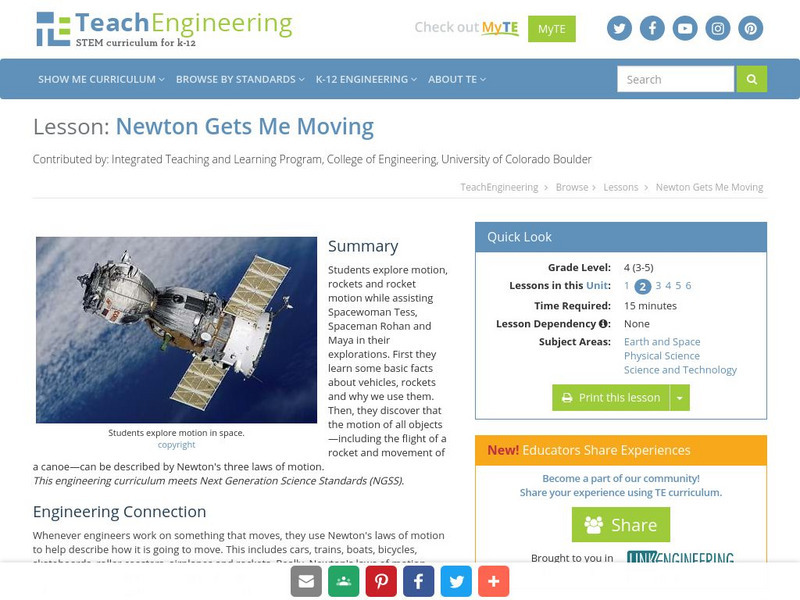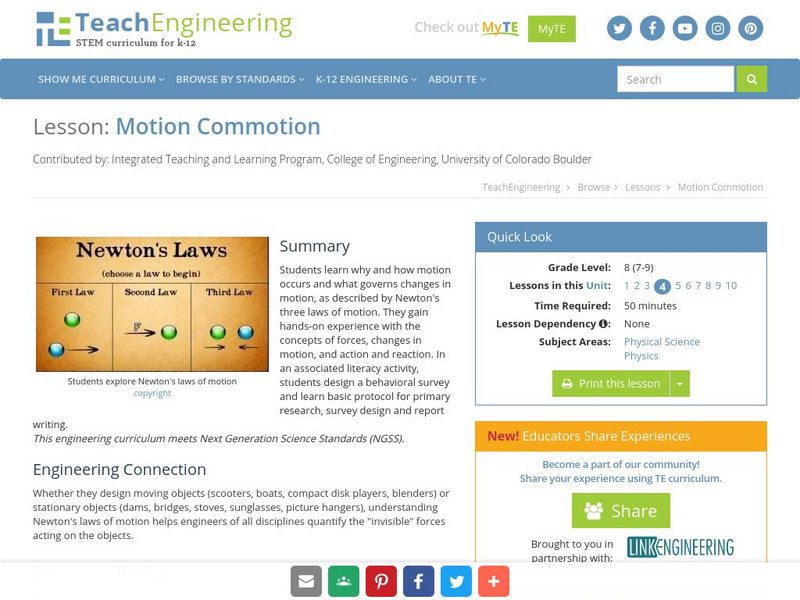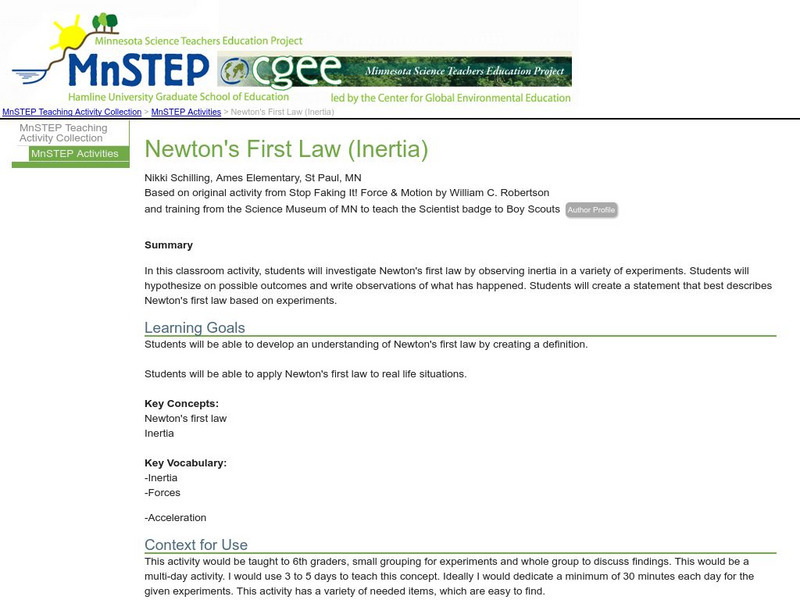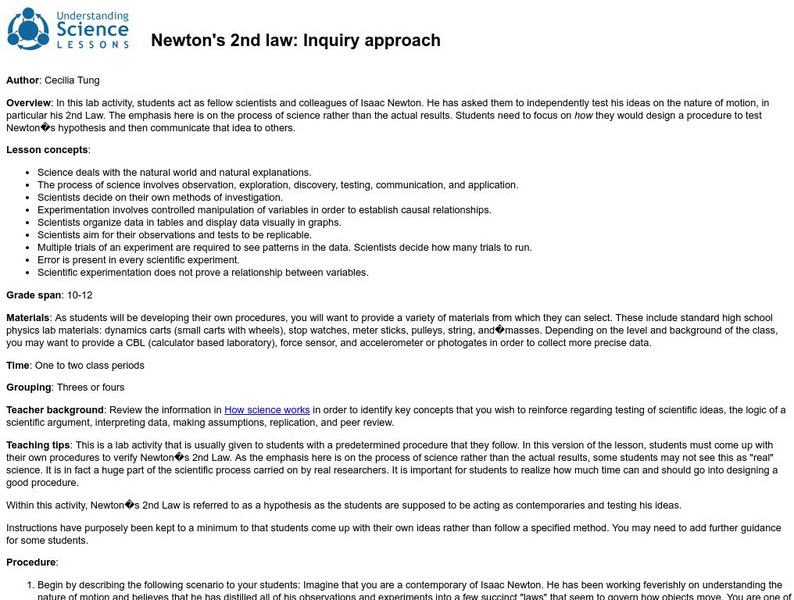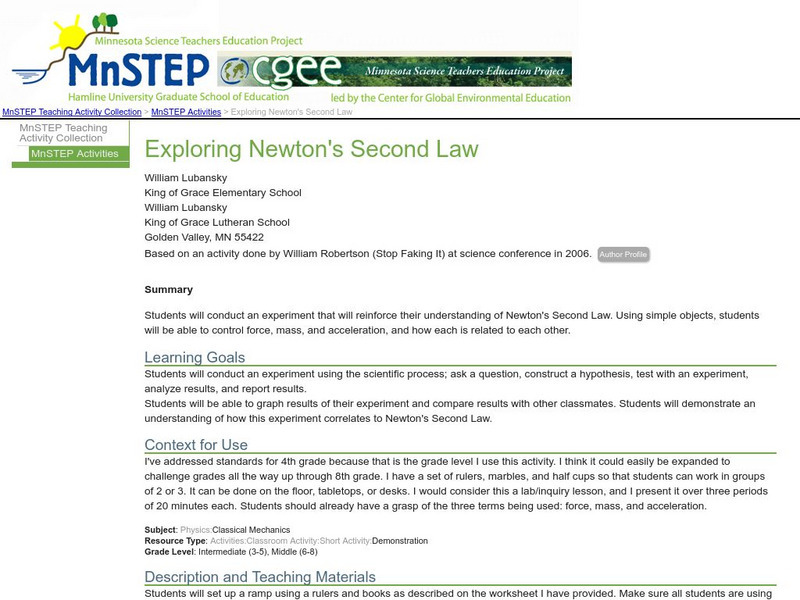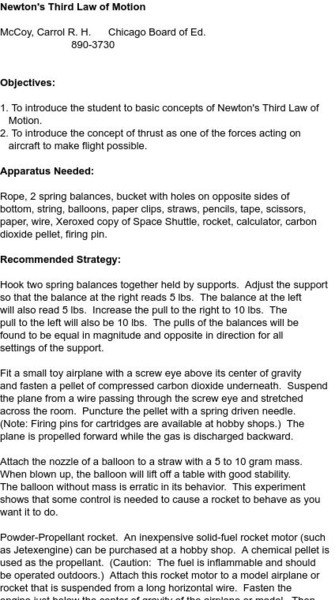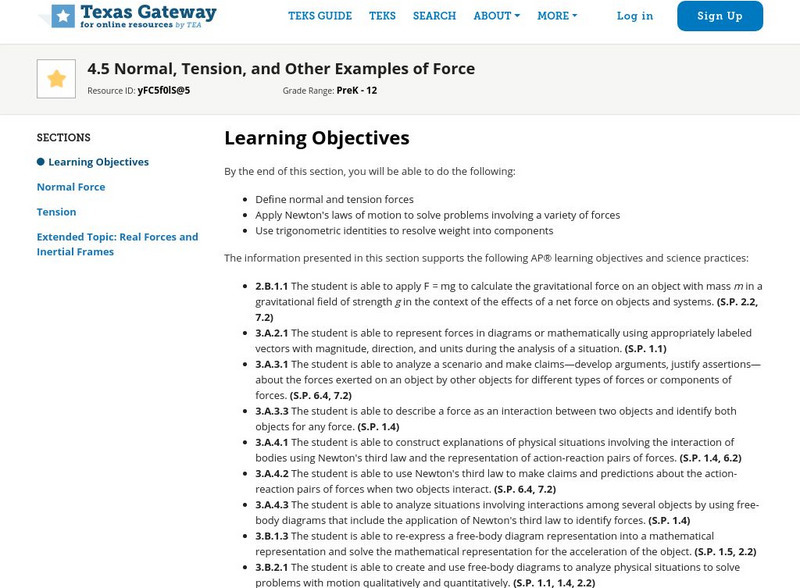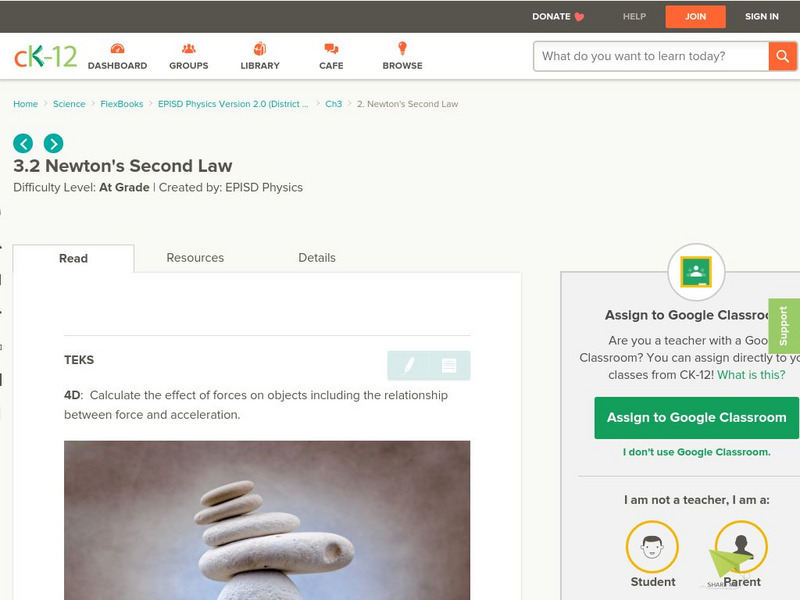TeachEngineering
Teach Engineering: Newton Gets Me Moving
In this instructional activity, students will explore motion, rockets and rocket motion while assisting Spacewoman Tess, Spaceman Rohan and Maya in their explorations. They will first learn some basic facts about vehicles, rockets and...
Science Education Resource Center at Carleton College
Serc: Newton's Second Law: How Does Acceleration Change With Varying Forces?
In this lab activity, students investigate the effects of changing force on the acceleration of a lab cart testing Newton's Second Law of Motion. They will use distance and time to calculate velocity and create a graph representing their...
TeachEngineering
Teach Engineering: Motion Commotion
Students learn why and how motion occurs and what governs changes in motion, as described by Newton's three laws of motion. They gain hands-on experience with the concepts of forces, changes in motion, and action and reaction. In an...
Science Education Resource Center at Carleton College
Serc: Newton's First Law (Inertia)
This activity provides students an opportunity to investigate Newton's first law by observing inertia in a variety of experiments. Students will hypothesize on possible outcomes, write observations of what has happened, and apply...
University of California
Understanding Science: Newton's 2nd Law: Inquiry Approach Lesson
For this lesson, students develop their own scientific experiment to test Newton's hypothesis that the acceleration of an object depends on the net force acting upon it and its mass. After completing their designed experiment, students...
Science Education Resource Center at Carleton College
Serc: Exploring Newton's Second Law
Students conduct an experiment that will reinforce their understanding of Newton's Second Law. Using simple objects, students control force, mass, and acceleration, and how each is related to each other.
Science Education Resource Center at Carleton College
Serc: Newton's Second: Having a Ball With Motion
Students will create a gravity ball launcher to demonstrate their understanding of mass, force, momentum, and motion. The students will use critical thinking, measurement, and observation and analysis of data to make changes and improve...
BBC
Bbc: Gcse Bitesize: Newton's Second Law
This lesson focuses on Newton's Second Law including the formula Force = mass to the x power acceleration, an example of how to calculate the force needed to accelerate based on mass, and a link to a test.
Science Education Resource Center at Carleton College
Serc: Investigating Projectile Motion: Predicting Point of Impact
Students discuss forces acting on objects in a trajectory motion. They review notes, study equations, solve projectile motion problems, and determine experimentally the impact point of a ball in projectile motion.
CK-12 Foundation
Ck 12: Plix Series: Projectile Motion: Object Launched Horizontally
[Free Registration/Login Required] Use the interactive diagram to solve a projectile motion problem. After the activity, answer a challenge question to check for understanding.
Other
Institute of Physics: Newton's Cradle
The interactive simulation demonstrates the conservation of momentum through a Newton?s Cradle simulation.
CK-12 Foundation
Ck 12: Plix Series: Projectile Motion: Object Launched at an Angle
[Free Registration/Login Required] Explore how angles affect the projectile motion of a thrown object. After the activity, answer a challenge question to check for understanding.
CK-12 Foundation
Ck 12: Newton's First and Second Laws of Motion
[Free Registration/Login may be required to access all resource tools.] Students explore the concept of inertia and how it applies to Newton's First Law. They also learn about Newton's Second Law and answer both numerical and conceptual...
University of Colorado
University of Colorado: Ph Et Interactive Simulations: Forces and Motion: Basics
See how forces affect various items that are pushed or pulled.
CK-12 Foundation
Ck 12 Exploration Series: Simulations: Physics: Newton's Cannon
[Free Registration/Login Required] Learn about orbits and how an object can stay in orbit under the influence of gravity. By adjusting launch velocities users will understand how to successfully put a virtual satellite into orbit without...
CK-12 Foundation
Ck 12 Exploration Series: Simulations: Physics: Tether Ball
[Free Registration/Login Required] Learn about centripetal motion in the context of the game of tether-ball.
CK-12 Foundation
Ck 12 Exploration Series: Simulations: Physics: Loop the Loop
[Free Registration/Login Required] Learn about the centripetal motion in the context of a roller coaster going through a loop-the-loop and over a hill.
Science and Mathematics Initiative for Learning Enhancement (SMILE)
Smile: Third Law of Motion
This Illinois Institute of Technology site is a lesson plan and lab that utilizes a toy rocket to investigate Newton's third law. Includes directions and practical applications.
Ducksters
Ducksters: Physics for Kids: Laws of Motion
Kids learn about the science behind the basic three Laws of Motion. Forces theory discovered by Isaac Newton.
Concord Consortium
The Concord Consortium: Molecular Workbench: Newton's Cradle
Adjust the mass of one of the balls to see how the other objects are affected in the animated Newton's Cradle.
University of Virginia
Uva Physics: Using Vectors to Describe Motion
Background information on vectors and their use in describing motion in two dimensions. A comparison of Aristotle's and Galileo's perspectives on force and motion is given.
Physics4kids
Physics 4 Kids: Laws of Motion Quiz
Take this ten question multiple choice quiz on laws of motion.
Texas Education Agency
Texas Gateway: 4.5 Normal, Tension, and Other Examples of Force
By the end of this section, you will be able to define normal and tension forces, apply Newton's laws of motion to solve problems involving a variety of forces, and use trigonometric identities to resolve weight into components.
CK-12 Foundation
Ck 12: Episd: Newton's Second Law
[Free Registration/Login may be required to access all resource tools.] Break down how the relationship between acceleration and mass directly relates to the mass of an object.
Other popular searches
- Newtons Laws of Motion
- Newton's Laws of Motion
- Newton's First Law of Motion
- Newton's Second Law of Motion
- Newton's Third Law of Motion
- Newtons First Law of Motion
- Newton Laws of Motion
- Newton's Law of Motion
- Newtons Second Law of Motion
- Newtons Third Law of Motion
- Newtons Law of Motion
- Newton's Three Laws of Motion
